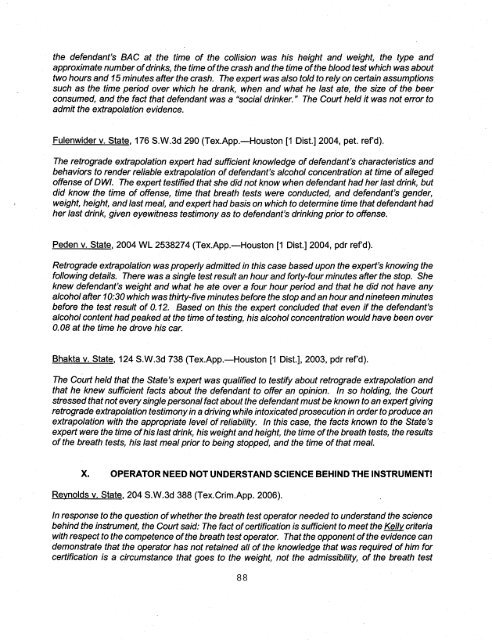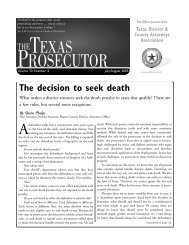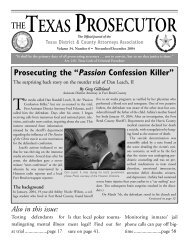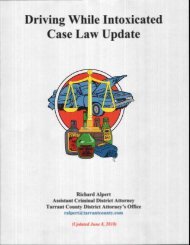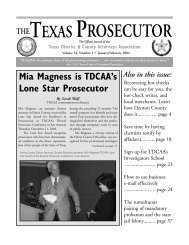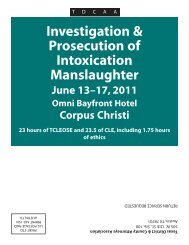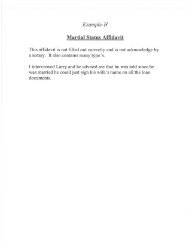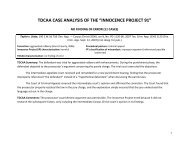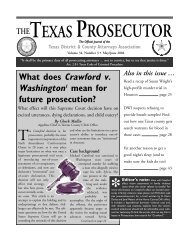Driving While Intoxicated Case Law Update - Texas District ...
Driving While Intoxicated Case Law Update - Texas District ...
Driving While Intoxicated Case Law Update - Texas District ...
Create successful ePaper yourself
Turn your PDF publications into a flip-book with our unique Google optimized e-Paper software.
the defendant's BAC at the time of the collision was his height and weight, the type and<br />
approximate number of drinks, the time of the crash and the time of the blood testwhich was about<br />
two hours and 1 5 minutes after the crash. The expert uras a/so told to rely on certain assumpftbns<br />
such as the time period over which he drank, when and what he last ate, the size of the beer<br />
consumed, and the fact that defendant was a "social drinker." The Court held it was not error to<br />
admit the extrapolation evidence.<br />
Fulenwider v. State, 176 S.W.3d 290 (Tex.App.-Houston [1 Dist.] 2004, pet. ref'd).<br />
The retrograde extrapolation expert had sufficient knowledge of defendant's characteristics and<br />
behaviors to render reliable extrapolation of defendant's alcohol concentration at time of alleged<br />
offense of DWl. The expert testified that shte did not know when defendant had her last drink, but<br />
did know the time of offense, time that breath fesfs were conducted, and defendant's gender,<br />
weight, height, and last meal, and expert had basis on which to determine time that defendant had<br />
her last drink, given eyewitness testimony as to defendant's drinking prior to offense.<br />
Peden v. State,2OO4WL2538274 (Tex.App.-Houston [1 Dist.] 2004, pdr ref'd).<br />
Retrograde extrapolation was properly admitted in fhrs case based upon the expert's knowing the<br />
following details. There was a single fesf resu/f an hour and forty-four minutes afterthe stop. She<br />
knew defendant's weight and what he ate over a four hour period and that he did not have any<br />
alcohol after 10:30which wasthirty-five minutes beforethe stop and an hour and nineteen minutes<br />
before the test result of 0.12. Based on this the expert concluded that even if the defendant's<br />
alcohol content had peaked at the time of testing, his alcohol concentration would have been over<br />
0.08 at the time he drove his car.<br />
Bhakta v. State, 124 S.W.3d 738 (Tex.App.-Houston [1 Dist.], 2A03, pdr ref'd).<br />
The Court held that fhe Sfafe's expert was qualified to testify about retrograde extrapolation and<br />
that he knew sufficient facts about the defendant to offer an opinion. ln so holding, the Court<br />
sfressed fh at not every single personal fact about the defendant must be known to an expert giving<br />
retrograde extrapolation testimony in a driving while intoxicated prosecution in order to produce an<br />
extrapolation with the appropriate level of reliability. ln fhis case, the facts known to the Sfate's<br />
expert were the time of his last drink, his weight and height, the time of the breath fesfs, fhe resu/fs<br />
of the breath fesfs, his last meal prior to being stopped, and the time of that meal.<br />
X. OPERATOR NEED NOT UNDERSTAND SCIENCE BEHIND THE INSTRUMENT!<br />
Reynolds v. State, 204 S.W.3d 388 (Tex.Crim.App. 2006).<br />
In response to the question of whether the breath test operator needed to understand the science<br />
behind the instrument, the Court said: The fact of certification is sufficientto meetthe Kellv criteria<br />
with respect to the competence of the breath test operator. That the opponent of the evidence can<br />
demonstrate that the operator has not retained all of the knowledge that was required of him for<br />
certification is a circumstance that goes to the weight, not the admissibility, of the breath test<br />
88


